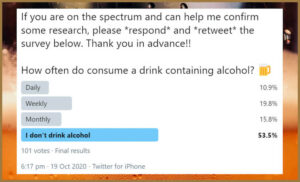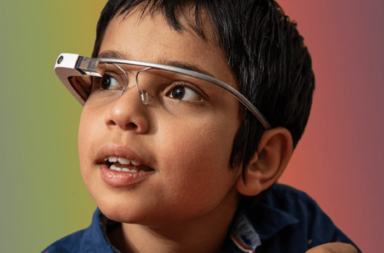Autism and alcohol affect everyone differently, so it’s little wonder why the effects of alcohol on autistic people are so diverse. In the past, this has frustratingly meant that a lot of research on the topic of autism and alcohol is contradictory and, in general, lacking – something which presents huge missed opportunities within autism academia (and I’m not just referring to the chance to have some fun booze based experiments).
To right this wrong and hopefully provide a bit more clarity on the correlation between autism and alcohol, this week, I wanted to look at the different ways that alcohol impacts the autistic community; including why autistic people are twice as likely to form addictions and what autistic people can do to get support when excessive drinking becomes habitual.

Autism and Alcohol Effects:
It’s unsurprising that drinking is one of the world’s oldest and most favoured pastimes. When consumed, it makes you feel on top of the world; as it blocks neurons responsible for stress and anxiety whilst, in larger quantities, it releases dopamine: a chemical designed to make you feel great.
When viewed through the autistic lens, this can make alcohol a very tempting sedative for the traits which some on the spectrum see as holding us back. Yet, as anyone who has ever sent a text after having one too many can attest, alcohol has its drawbacks and we’re not just talking heart and liver damage.
For autistic people, alcohol can mean a complete loss of self-control, as we find our thoughts are slowed down, our memories hazy and, worst of all, we can become trapped by strangers who are talking about football. However, even these hazards are nothing when they are compared to the fact that most ‘nights out’ will usually involve a bar full of loud noises, cramped spaces and other things to distress our senses.
As such, many autistic people will understandably abscond when it comes to discussions of drinking and, as a recent survey I created for this post shows, many will choose not to drink at all (see below).
This isn’t to say that autistic people never drink though, as many on the spectrum will find that the trade-off between alcohol’s negatives and positives will teeter throughout the year. This was demonstrated in response to the previously mentioned survey, in which one user replied to the question of ‘how often do you have a drink containing alcohol?’ with ‘Impossible to answer, as I go from not drinking at all for weeks to using alcohol to cope with anxiety more regularly.’

Are Autistic People at Risk of Alcohol Addiction?
It would be easy to look at the above figures and surrounding information and assume that autistic people are not at risk of becoming addicted to alcohol. Yet, as studies which didn’t involve just shouting into the void of Twitter have proven, of the autistic people who do drink, they are twice as likely to form unhealthy dependencies.
Like everything within autism, the answer to why this large spike occurs is unclear. However, in recent years, two leading hypothesises have emerged, which are that:
- Alcohol’s slow addiction plus the autistic ease of building a routine make a dangerous duo.
- As drinking is more common in those with high IQs, it may be that some deem it a necessary evil to overcome the severe mental health challenges that also commonly occur.
Nevertheless, despite already high figures, risk of alcohol addiction in autistic people may be even greater still, when you consider those who are awaiting or have not been diagnosed.
In many instances, this comes as a result of findings that people will use drink as a crutch when out with friends and even at work, as years of unsupported anxieties and misunderstandings make users feel they need a bottle of ‘liquid courage’ just to leave the house.
In a sense, this has caused many to see drinking as a form of autistic masking, in which people from all over the spectrum will drink to fit in (or at least feel comfortable whilst trying to fit in) – a dependency which, regardless of relation to the spectrum, poses incredible dangers. So, what can be done to stop or support someone with a drinking problem?
Side note: While alcohol can disguise some autistic traits, they do not hide them all i.e restrictive interest and lack of eye contact. If you believe someone may be on the spectrum and that a diagnosis may help, then check out this article on what to do if you think someone is autistic.

How to Help Autistic People with Drinking Problems?
When it comes to supporting autistic people with drinking addictions, any support offered must be delivered by someone who understands the complexities of the condition over the complexities of the addiction. This is because many mainstream therapies will involve group talks, peer interaction and other opportunities to overload on social anxiety and, subsequently, the techniques used may be more detrimental than beneficial to an autist.
Unfortunately, due to the lower ratio of autistic people in need of these services, options for helping autistic people with addiction can at first seem disheartening. Nevertheless, this isn’t a reason to give up, as each year great advancements are being made in these kinds of therapy (both specialised care and adapting current practices). So, don’t give up as local charities can always provide direction.
But how do you encourage an autistic person to find support once you have sourced somewhere to go? Well, in most cases, while social anxieties present challenges with group therapy, there is a small set of research which suggest that, as autistic people are more likely to see one view as an opinion and multiple views as fact, interventions are an ideal first step to encouraging autistic people to recognise they have a problem.
With that said, I can certainly see some challenges when approaching these talks this way. So, for those who also think this might be a challenge, instead try raising your concerns in a calm, secluded setting with plenty of time and potentially touch on some of the following:
- How the person is different when they drink
- Opportunities they are missing out on because of drink
- Asking what causes them to drink in the first place
Understandably, these talks will seem tough. However, autistic or not, the road to recovery is never easy. Be prepared that no addiction gets resolved in the blink of an eye and also understand that there will be some regression along the way. Keeping these things in mind and remembering to stay patient during the battle all but ensures you will find some success and soon you will discover that even the most wrecked lifestyle isn’t beyond repair.

Carry on the Conversation:
What improvements would you like to see in autism and addiction research? Let me know in the comments below. And, if you would like to read about 5 ways to beat anxiety (all of which are much more reliable and safer than alcohol) then check out this article: 5 Tips to Help Manage Anxiety in Autistic People.
As always, I can also be found on Twitter @AutismRevised, on Instagram @autisticandunapologetic and via my email: AutisticandUnapologetic@gmail.com.
If you like what you have seen on the site today, then show your support by liking the Autistic & Unapologetic Facebook page. Also, don’t forget to sign up to the Autistic & Unapologetic newsletter (found on the sidebar on laptops and underneath if you are reading this via mobile) where I share weekly updates as well as a fascinating fact I have found throughout the week.
Thank you for reading and I will see you next week for more thoughts from across the spectrum.


